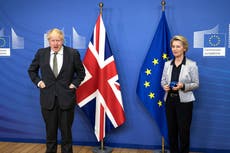UK travellers to be barred from EU under coronavirus rules after Brexit transition period
UK is not among the eight countries currently on EU ‘safe’ list
UK citizens face a ban on most travel to EU states from 1 January when the Brexit transition period ends, as a result of coronavirus restrictions.
Foreign secretary Dominic Raab wrongly claimed that the ban on non-essential travel was not linked to Brexit.
But EU officials confirmed that it was being applied to the UK because of its transition out of the EU’s structures at the end of 2020.
“As from 1 January 2021 EU law will no longer apply to the UK,” said an EU source, adding that this means that “the UK will become subject – as other third countries” to the restriction on non-essential travel.
Meanwhile, France’s Europe minister confirmed that Brexit means that, even after the end of the Covid-19 pandemic, UK citizens are expected to require a visa to remain within the Schengen travel area – covering most of the EU apart from Ireland – for more than 90 days in a 180-day period.
Clement Beaune said the matter was still being negotiated, but added: “For stays of more than three months, there may be visa applications, professional or other, and this is a point that is still under discussion.”
The UK is currently included in rules allowing travel within the bloc during the pandemic.
But from the start of next year it will join the same system as every other non-EU nation, whereby access to the bloc is decided by the severity of a country’s outbreak.
So far just eight countries are included on the EU’s list of “safe” third nations, including Australia, Japan, New Zealand and South Korea.
The safe list is due for review in the week of 14 December, but it is understood that there are currently no proposals to add the UK. Even if a proposal is made, the country would still have to meet technical criteria for inclusion.
The commission’s website says these include “the epidemiological situation and containment measures, including physical distancing, as well as economic and social considerations”.
Not all EU member states admit travellers from every country on the “safe” list, with just 12 of the 27 member states applying the list in full.
UK citizens with EU residence permits or with family members who are EU citizens will continue to be allowed to travel to and from the continent.
Britons who may still be able to enter the EU because their travel is classed as “essential” include healthcare workers, frontier staff, seasonal agricultural workers, transport personnel, diplomats, humanitarian aid workers, seafarers and passengers in transit.
Trips for “imperative family reasons”, for the purpose of study, for humanitarian protection or for work by highly-qualified individuals which cannot be postponed or performed outside the EU.
Mr Raab told BBC Radio 4’s Today programme: “Covid restrictions will depend on the combination of what the EU decides but also member states, and we’ve already got challenges with that.
“Linking it to Brexit ... is I don’t think right.
“The arrangements, whether we’ve got a free trade deal or otherwise, are that Brits can go over there for 90 days in any 180 day period.
“Covid, very much in the rest of Europe as in the UK, remains a live issue, and we need to make sure we’ve got control of it and I’m afraid restriction on travel inevitably is going to be something that’s kept under review.”
He added: “Between now and the spring, when the vaccine hopefully will have changed matters so we can move back to something closer to normal, we’re going to have to keep a very close eye control over the virus, with the tiered restrictions, with the mass testing. Other European countries will be doing the same.
“And in the meantime, yes, the travel restrictions the quarantine rules and the rest of it will have to track the progress we make.”
A earlier statement issued by a government spokesperson said: “We take a scientific, risk-based approach to health measures at the border, and it is of course in the interests of all countries to allow safe international travel as we emerge from the pandemic.”
Join our commenting forum
Join thought-provoking conversations, follow other Independent readers and see their replies
Comments



Bookmark popover
Removed from bookmarks